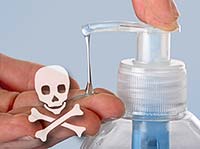5 Tips for Hand Washing MRSA Prevention

Hand washing is the easiest way to help remove MRSA germs from your hands, but beware using antibacterial soaps.
Hand washing is an important defense against infections like MRSA and Staph. But most people don’t know the right MRSA hand washing techniques. And using antibacterial soaps actually does more harm than good.
The 5 MRSA handwashing tips below will show you the right way to wash. And the hand washing FAQ’s will answer your questions about handwashing and MRSA.
5 Tips on hand washing and MRSA prevention
The key to successfully preventing MRSA using handwashing is to wash correctly but without becoming a germ-o-phobe. Below are seven helpful hand washing tips:
- Use warm soap and water for Staph & MRSA prevention. Wash your hands together for about 10-15 seconds using a natural soap. Get under your nails and dry your hands with a paper towel or air dryer.
- Wash your hands frequently, but not obsessively. Over-washing can create dry, cracked hands which makes a perfect way for germs to enter through your skin and cause infections.
- Avoid using shared towels to dry your hands, especially in public. If someone in your house has an active infection, they should have their own towel.
- Avoid antibacterial soaps because they have been shown to contribute to antibiotic resistance (see more below). Natural soaps are just as effective at removing bacteria, and are less harsh on your skin.
- Wash your hands well after touching any high-use public surfaces or objects, such as public restroom surfaces, door knobs, sink handles, waiting room books, keyboards, cell phones and remote controls, for example.
MRSA handwashing FAQs
Washing your hands properly with soap and water removes many bacteria, virus and other germs from your hands, including MRSA. Washing up is unable to totally eliminate all germs, but it greatly reduces the contamination on your hands and is a simple and very effect way to reduce the spread of MRSA and Staph.
Everyone comes into contact with many different germs everyday. While hand washing can’t prevent germs from getting onto your hands, it does remove those germs before they have a chance to get inside your body and cause an infection. The key is to wash often, wash properly and to wash after touching high-risk surfaces or objects.
The best soap is actually not antibacterial at all. As shown below, antibacterial soaps are a poor choice for infection control. These soaps have been linked to creating antibiotic resistant bacteria and have been proven to be no more effective than regular soap and water. A better choice is good-old-fashioned soap and water.
That depends on where you are, what you’re doing and the level of risk in your surroundings. The most important times to wash up are:
- Before eating or applying makeup
- After touching suspect surfaces and objects. This includes things that many people touch or have contact with, such as door knobs and shopping cart handles to name a few.
- When in high-risk environments, including hospitals, nursing homes and crowded public places.
If you are prone to dry, cracked skin, the following tips can help:
- Use a hand moisturizer after washing.
- Use only mild natural soaps, which are usually more gentile on skin.
- Consider using disposable gloves in high-risk environments, such as dressing an open wound, to protect germs from entering through your cracked skin.
Carry a personal hand sanitizer with you to help protect your hands when you’re on the go. Be careful with alcohol based sanitizers as they may also contain antibacterial agents or chemicals that add to the toxic burden to your body. My favorite hand sanitizers contain natural essential oils in which you can buy or make yourself.
The Dangers of antibacterial soaps

Due to the health risks associated with antibacterial ingredients in liquid soaps, they’ve been banned or restricted in many other countries outside the U.S.
Many experts now agree that antibacterial soaps are no more effective than regular soaps. Most liquid and commercial soaps in the US now contain antibacterial ingredients like “Triclosan”. They are used everywhere now, and they are even in toothpaste, mouthwash, lotion, shampoo, baby care products, toys and plastics.
Scientific experts and the American Medical Association have questioned the use of these agents for some time now. And rightly so. Recently the FDA has announced that it will be looking into Triclosan, one of the most commonly used antibacterial agents. Triclosan has already been banned or restricted in many other countries including the European Union, but not in the US.
Here’s what you need to know about these artificial germicidal soaps:
- Antimicrobial ingredients kill off your protective “good bacteria” that live on your skin, letting “bad bacteria” survive on your skin more easily.
- These chemical agents are suspected endocrine disruptors (meaning they can cause hormonal imbalances).
- Some have been shown to kill human cells in laboratory testing.
- Antibacterial agents are strongly suspected of causing bacterial resistance, thus creating superbugs like MRSA.
Simple hand washing using warm water and natural soap is the best choice. It has been shown to work just as well as using antibacterial soaps, without all of the health risks. If you’re looking for a safe alternative to antibacterial soaps, try adding essential oils to your favorite natural liquid soap.

- MSRA bathing tips – how taking a bath can help with infections
- Cleaning and Disinfection Tips for MRSA – Help keep yourself safe
- Michelle’s prevention and infection control program




